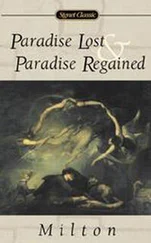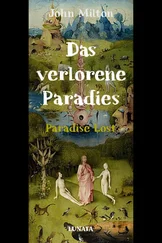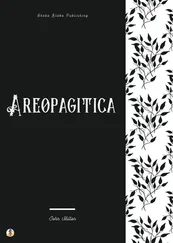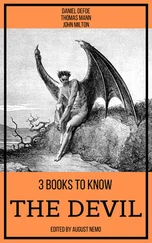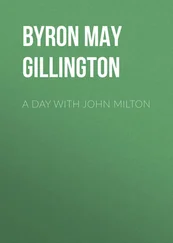Eld. Bro. List! List! I hear
Some far–off hallo break the silent air.
SEC. BRO. Methought so too; what should it be?
ELD. BRO. For certain,
Either some one, like us, night–foundered here,
Or else some neighbour woodman, or, at worst,
Some roving robber calling to his fellows.
SEC. BRO. Heaven keep my sister! Again, again, and near!
Best draw, and stand upon our guard.
ELD. BRO. I'll hallo!
If he be friendly, he comes well: if not,
Defence is a good cause, and Heaven be for us!
The ATTENDANT SPIRIT, habited like a shepherd.
That hallo I should know. What are you? speak.
Come not too near; you fall on iron stakes else.
SPIR. What voice is that? my young Lord? speak again.
SEC. BRO. O brother, 't is my father's Shepherd, sure.
ELD. BRO. Thyrsis! whose artful strains have oft delayed
The huddling brook to hear his madrigal,
And sweetened every musk–rose of the dale.
How camest thou here, good swain? Hath any ram
Slipped from the fold, or young kid lost his dam,
Or straggling wether the pent flock forsook?
How couldst thou find this dark sequestered nook?
SPIR. O my loved master's heir, and his next joy,
I came not here on such a trivial toy
As a strayed ewe, or to pursue the stealth
Of pilfering wolf; not all the fleecy wealth
That doth enrich these downs is worth a thought
To this my errand, and the care it brought.
But, oh! my virgin Lady, where is she?
How chance she is not in your company?
ELD. BRO. To tell thee sadly, Shepherd, without blame
Or our neglect, we lost her as we came.
SPIR. Ay me unhappy! then my fears are true.
ELD. BRO. What fears, good Thyrsis? Prithee briefly shew.
SPIR. I'll tell ye. 'T is not vain or fabulous
(Though so esteemed by shallow ignorance)
What the sage poets, taught by the heavenly Muse,
Storied of old in high immortal verse
Of dire Chimeras and enchanted isles,
And rifted rocks whose entrance leads to Hell;
For such there be, but unbelief is blind.
Within the navel of this hideous wood,
Immured in cypress shades, a sorcerer dwells,
Of Bacchus and of Circe born, great Comus,
Deep skilled in all his mother's witcheries,
And here to every thirsty wanderer
By sly enticement gives his baneful cup,
With many murmurs mixed, whose pleasing poison
The visage quite transforms of him that drinks,
And the inglorious likeness of a beast
Fixes instead, unmoulding reason's mintage
Charactered in the face. This have I learnt
Tending my flocks hard by i' the hilly crofts
That brow this bottom glade; whence night by night
He and his monstrous rout are heard to howl
Like stabled wolves, or tigers at their prey,
Doing abhorred rites to Hecate
In their obscured haunts of inmost bowers.
Yet have they many baits and guileful spells
To inveigle and invite the unwary sense
Of them that pass unweeting by the way.
This evening late, by then the chewing flocks
Had ta'en their supper on the savoury herb
Of knot–grass dew–besprent, and were in fold,
I sat me down to watch upon a bank
With ivy canopied, and interwove
With flaunting honeysuckle, and began,
Wrapt in a pleasing fit of melancholy,
To meditate my rural minstrelsy,
Till fancy had her fill. But ere a close
The wonted roar was up amidst the woods,
And filled the air with barbarous dissonance;
At which I ceased, and listened them awhile,
Till an unusual stop of sudden silence
Gave respite to the drowsy–flighted steeds
That draw the litter of close–curtained Sleep.
At last a soft and solemn–breathing sound
Rose like a steam of rich distilled perfumes,
And stole upon the air, that even Silence
Was took ere she was ware, and wished she might
Deny her nature, and be never more,
Still to be so displaced. I was all ear,
And took in strains that might create a soul
Under the ribs of Death. But, oh! ere long
Too well I did perceive it was the voice
Of my most honoured Lady, your dear sister.
Amazed I stood, harrowed with grief and fear;
And "O poor hapless nightingale," thought I,
"How sweet thou sing'st, how near the deadly snare!"
Then down the lawns I ran with headlong haste,
Through paths and turnings often trod by day,
Till, guided by mine ear, I found the place
Where that damned wizard, hid in sly disguise
(For so by certain signs I knew), had met
Already, ere my best speed could prevent,
The aidless innocent lady, his wished prey;
Who gently asked if he had seen such two,
Supposing him some neighbour villager.
Longer I durst not stay, but soon I guessed
Ye were the two she meant; with that I sprung
Into swift flight, till I had found you here;
But further know I not.
SEC. BRO. O night and shades,
How are ye joined with hell in triple knot
Against the unarmed weakness of one virgin,
Alone and helpless! Is this the confidence
You gave me, brother?
ELD. BRO. Yes, and keep it still;
Lean on it safely; not a period
Shall be unsaid for me. Against the threats
Of malice or of sorcery, or that power
Which erring men call Chance, this I hold firm:
Virtue may be assailed, but never hurt,
Surprised by unjust force, but not enthralled;
Yea, even that which Mischief meant most harm
Shall in the happy trial prove most glory.
But evil on itself shall back recoil,
And mix no more with goodness, when at last,
Gathered like scum, and settled to itself,
It shall be in eternal restless change
Self–fed and self–consumed. If this fail,
The pillared firmament is rottenness,
And earth's base built on stubble. But come, let's on!
Against the opposing will and arm of heaven
May never this just sword be lifted up;
But, for that damned magician, let him be girt
With all the grisly legions that troop
Under the sooty flag of Acheron,
Harpies and Hydras, or all the monstrous forms
'Twixt Africa and Ind, I'll find him out,
And force him to return his purchase back,
Or drag him by the curls to a foul death,
Cursed as his life.
SPIR. Alas! good venturous youth,
I love thy courage yet, and bold emprise;
But here thy sword can do thee little stead.
Far other arms and other weapons must
Be those that quell the might of hellish charms.
He with his bare wand can unthread thy joints,
And crumble all thy sinews.
ELD. BRO. Why, prithee,
Shepherd,
How durst thou then thyself approach so near
As to make this relation?
SPIR. Care and utmost shifts
How to secure the Lady from surprisal
Brought to my mind a certain shepherd lad,
Of small regard to see to, yet well skilled
In every virtuous plant and healing herb
That spreads her verdant leaf to the morning ray.
He loved me well, and oft would beg me sing;
Which when I did, he on the tender grass
Would sit, and hearken even to ecstasy,
And in requital ope his leathern scrip,
And show me simples of a thousand names,
Telling their strange and vigorous faculties.
Amongst the rest a small unsightly root,
But of divine effect, he culled me out.
The leaf was darkish, and had prickles on it,
But in another country, as he said,
Bore a bright golden flower, but not in this soil:
Unknown, and like esteemed, and the dull swain
Treads on it daily with his clouted shoon;
Читать дальше

